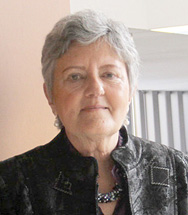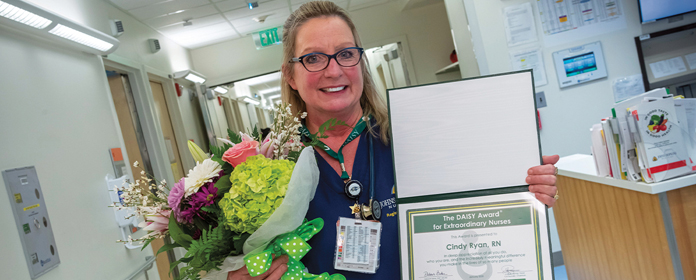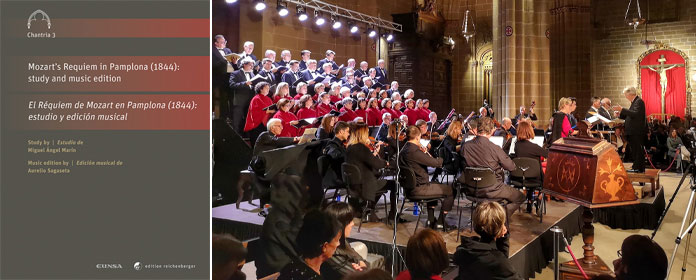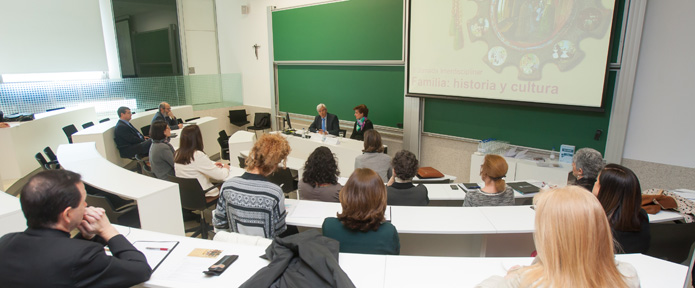“Si una mujer prefiere cuidar de sus hijos y trabajar en casa, debe percibir un salario familiar porque está realizando una tarea educativa”
María Antonia Bel Bravo, profesora de la Universidad de Jaén, intervino en la II Jornada interdisciplinar sobre la familia de la Universidad

María Antonia Bel Bravo, profesora titular de Historia Moderna de la Universidad de Jaén, intervino como ponente en la II Jornada interdisciplinar sobre la familia celebrada en la Universidad de Navarra. La actividad fue coordinada por el Instituto Cultura y Sociedad por iniciativa del Vicerrectorado de Investigación.
¿Qué cambios ha experimentado la familia en las últimas décadas?
En las últimas décadas, la incorporación de la mujer al mercado laboral ha sido uno de los factores que más ha influido en el devenir de la familia. La mujer ha entrado a formar parte de un mercado hecho única y exclusivamente con parámetros varoniles. Desde entonces, sigue al cuidado de la casa pero con unos horarios excesivos; se le exigen una serie de cuestiones que no puede compatibilizar.
¿Qué retos tiene la familia en la actualidad?
Los resumiría en tres: conciliación, incentivos económicos para los hijos y salario materno. Algunas de estas propuestas ya son reales en países del norte de Europa.
El gran reto que tiene la sociedad actual es la conciliación de la vida laboral con la vida familiar. Se trata de un asunto difícil, pero que hay que empezar a abordar por el tema de los horarios. Una propuesta sería un horario partido en el que dos mujeres puedan compartir un puesto, una por la mañana y otra por la tarde, para que puedan dedicarse a su familia el resto del tiempo. Muchos se llevan las manos a la cabeza con proposiciones como esta, pero son necesarias.
¿Qué hay de las políticas familiares?
Es necesario premiar a la gente que tenga hijos porque, demográficamente, España está envejecida; Europa entera está envejecida. Por ello, abogo por un salario familiar: si una mujer prefiere cuidar de sus hijos y trabajar en casa, debe percibir un salario familiar.
Se trata de una propuesta polémica porque las feministas creen que el salario familiar impulsará la vuelta de las mujeres a sus casas como en épocas anteriores. Sin embargo, creo que la mujer que quiere quedarse en su casa tiene que poder hacerlo y para ello, la sociedad y los gobiernos deberían proporcionarles un sueldo porque, en el fondo, están realizando una tarea educativa.
¿Qué nuevas tendencias se observan en la familia?
En este momento, el Gobierno se preocupa solo por salir de la crisis económica, pero no tiene el toro cogido por los cuernos. La crisis no es solo la balanza de pagos, sino también es que cada día los ciudadanos sufren un gran estrés por no poder compatibilizar su vida laboral y su vida familiar. Es necesario propiciar una política familiar importante.
¿Por qué se puede considerar la familia como un factor de estabilidad social?
Son muchos los pensadores de la Edad Moderna que piensan que una sociedad no puede ser mejor que las familias que la componen. Unos de forma explícita y otros de forma tácita, pero todos están de acuerdo en que si la familia no funciona, tampoco lo hace la sociedad. Este es el tema fundamental de sus críticas.
Los pensadores de esta época defienden que algunos episodios como el abandono de los niños en los hospicios o el dejar a las mujeres solas porque los hombres se van a ‘hacer las Américas’ acaban por desestabilizar la sociedad: mujeres solas, niños abandonados o marginados… Por tanto, no se puede pretender una sociedad mejor que las familias que la componen.
¿Qué podemos aprender del papel que ha desempeñado la familia a lo largo de la historia?
La historia no se repite, pero enseña a plantear bien los problemas. Todo el mundo sabe que un problema bien planteado está ya medio resuelto. Por tanto, la gente que conoce la historia sabe resolver los problemas.
¿Por qué es importante reflexionar sobre la familia en una jornada de investigación como esta?
Una de las mayores ventajas de la celebración de jornadas como la de la familia es que consigue poner en contacto a personas que trabajan en los mismos campos de investigación y que, aunque a lo mejor no están de acuerdo en todo, pueden contrastar opiniones. Esto siempre es enriquecedor.




